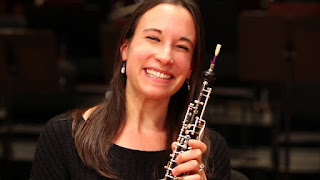Principles matter, principals matter: ISO continues its surge through Classical Series stretch
 |
| Jennifer Christen has been ISO principal oboe since 2012 |
In no particular order, here are the crises that the ISO has come through: a wrenching switch of music director; the new music director's youth emphasis in hiring, which resulted in a few successes and a few errors, including established principals who felt threatened; labor-management strife that climaxed in a lockout, and the generalized trial of COVID-19. A further challenge that was certainly influenced by those just named has been financial stability and audience loyalty.
Just as Tamino and Pamina had to keep faith through trials of fire and water and tests of mutual devotion, the ISO's crises have had an intriguing variety. To go immediately to one of them (new hires), and to cast the analogy to Mozart's opera aside before it breaks down totally, is a personnel change that bore fruit immediately: the hiring of Jennifer Christen as principal oboe in May 2012.
Christen had provided many bright spots in every oboe solo in ISO repertoire (and there are many of
 |
| German conductor Christian Reif makes ISO debut. |
them) when she was customarily first-chair. So the extended spotlight she was scheduled for in the pandemic-interrupted season of 2019-20 has been highly anticipated. It is shining on her finally in this weekend's Classical Series performances of Richard Strauss' Oboe Concerto, the second of which is this afternoon at 5:30.
In the first of them, Friday night, under the baton of guest conductor Christian Reif, she was as soaringly eloquent as expected. The mastery of Strauss' long, floating phrases — which was so evident in the defining oboe solo in "Don Juan" two weeks ago — was consistent and fully supported. The tone blossomed continually, as if nothing could come along to diminish it, including the stressful need to find moments for breathing.
The second movement "Andante" eased up on the unrelenting demands of its predecessor. Shorter phrases allowed to emerge Christen's skill in giving shape to each of them. Here and in the finale, the soloist unfailingly exploited how lyrically the phrases peak just enough to stand out while also linking to their neighbors. Christen's playing of cadenzas in the second and third movements exemplified virtuosity at its smoothest. The orchestra's accompaniment was sustained under Reif's explicit, big-gestured management.
 |
| Augusta Read Thomas' "Sun Dance" shines. |
In the second half, another delayed treat — this one in a series of commissioned pieces intended to respond to a specific Beethoven symphony — is on the program. Special celebrations all over the world in celebration of the composer's 250th birth anniversary were either postponed or canceled, thanks to COVID. Now ISO patrons can hear Augusta Read Thomas' "Sun Dance" as a fresh-faced companion to Symphony No. 6 in F, op. 68 ("Pastoral").
The new work, about which the composer is keen to promote understanding (and did so in remarks from the stage), is a six-minute display of ensemble adeptness and full-palette use of orchestral color. The spectrum is constrained by design in that the composer was asked to duplicate Beethoven's scoring; she made a couple of exceptions, incorporating piano and, with particular flair, percussion.
The world premiere, dedicated to the memory of British composer-conductor Oliver Knussen (1952-2018), enchanted throughout. It had the blaze and subtlety of sunlight in its various aspects, and it certainly danced. It made good use of brief brass solos and, toward the end, featured a well-designed showcase for the percussion section.
The notably fervent devotion to natural phenomena — and a rural community's place in partially domesticated nature — is of course a distinguishing characteristic of Beethoven's Pastoral Symphony. From the first movement on, Reif conducted some brilliant passages of acceleration, and he was insistent enough on the rustic tone-painting of the third movement that he had orchestra members supplement it by stomping their feet to underline the accents in the country-dance passages.
The storm music had good definition as well as the scary energy of threatening cloudbursts, and the subsequent process of calming was convincingly managed. There was sincerity as well as proper indulgence in Beethoven's detailed expression of the townsfolk's pious gratitude for having come through safely. Coming through safely, but with more than a dash of excitement, seems to be what the ISO is all about lately.



Comments
Post a Comment